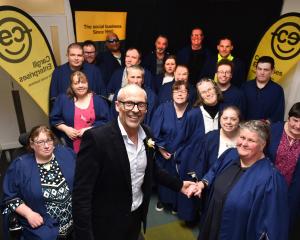That is, unless you are deaf, some Dunedin parents believe.
Isis Broad was born profoundly deaf and has been in mainstream education since primary school.
Despite ongoing assistance from teacher aides, itinerant teachers and communicators, the 16-year-old is still only able to read at the level of a 7 or 8-year-old.
Her father, Jeff Broad, says this is because no-one has been speaking her language.
Since the age of 2, Isis has talked to her family using New Zealand Sign Language (NZSL), but most people she has come across in the education system use either signed English or limited NZSL.
This infuriates Mr Broad, who believes Isis should be taught in NZSL.
"It's a right because it's a recognised language in New Zealand, but the Ministry of Education has never set anything up to train communicators," he said.
Isis attends Otago Girls' High School and enjoys school because she is a "social creature" and likes seeing her friends.
However, up to 10 hours of her week were spent isolated in a classroom with an itinerant teacher who could not sign fluently, Mr Broad said.
Someone who was fluent in NZSL and a communicator, not a teacher aide, was what he wanted for Isis.
A communicator would have a solid background in the language and, with training, would be capable of interpreting subject concepts and breaking them down for a pupil, he said.
Isis agreed, saying communicators were good because "they understand the language".
But she went one step further and said: "I'd like deaf teachers."
Mr Broad also believed all teachers should be taught NZSL as part of their training.
"I just want her to get the education she is entitled to."
Ann Barr, who has a profoundly deaf son, Caleb Ryder (11), agrees.
Caleb was diagnosed as being profoundly deaf when he was 4 and soon started to learn NZSL.
While his whole family is fluent in the language, at school, Macandrew Intermediate, it is a different matter.
Caleb receives 15 teacher aide hours, five Ongoing and Reviewable Resourcing Schemes hours, and five hours with a teacher of the deaf each week.
But his teacher cannot speak NZSL, and if his teacher aide is unavailable, he is left by himself in the classroom with hearing children.
"How would parents feel if their child was with a deaf teacher all day? You can't leave them in the lurch. They need to have some support there for them," Mrs Barr said.
She believed Caleb was treated differently from hearing children and this was inhibiting his right to a fair education.
"We have the right to have our kids in mainstream school and their culture to be understood."
"They are not dummies. I think they should get a fair education."
For her, the answer was simple.
Teach NZSL at teachers college and open up avenues for education professionals and the general public to learn the language.
If the Ministry of Education was not willing to support deaf children, the Government making NZSL an official language of New Zealand was a hollow token, she said.
"The Government passed it. They need to back it up."
Otago Girls' High School principal deputy principal Jock Murley said it "would be great if all teachers knew sign language".
"But the reality is that they don't and ... the facilities for learning it have not been widely available.
"The reality is that more staff are learning, but it's not going to be an overnight fix."
Macandrew Intermediate principal Whetu Cormick said the Government needed to invest in schools to ensure they were sufficiently resourced to enable all children to achieve.
"Our education system is pretty good ... but I think we could be doing better."












